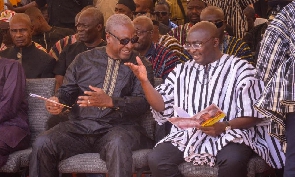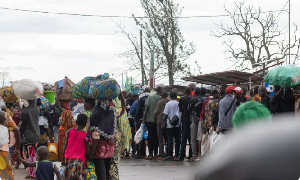Isaac Karikari (bkkarikari@yahoo.com)
The first time I heard the term “sakawa” it was being used in relation to internet fraud. That was somewhere in 2002 or 2003. Then, I was told it was prevalent in areas such as Nima, Accra. I remember hearing about the “exploits” and “feats” of young guys in Nima, how they always managed to make purchases and place orders over the internet. I even remember hearing tales of how men from American security agencies were sent here to save their citizens back home from the “raid”.
The last time I heard the term “sakawa”, courtesy a Daily Guide report, it was now being used in reference to rituals people engage in for money, which is popularly referred to as blood money. In that particular report the origin of the word “sakawa” as a term for internet fraud was traced. If there was any surprise when I read the news report, then it was with the use of the term “sakawa” for what can best be described as “blood money”, and not the prevalence of such practices. It is common knowledge that lately lots of young people engage in occult practices for quick money. The involvement of young people in occultism is in actual fact nothing new. What is really worrying is the proportion and dimensions it is now assuming. Young people, especially guys, have “always” dabbled in such acts. It is not the preserve of boys alone. There are some young girls and ladies who are also into occultism.
“Sakawa” only gives an indication that with regard to their involvement in the occult, things are getting sophisticated; an “upgrade”, is taking place.
Back in the day when our senior high schools were called senior secondary schools (and most probably even before they became senior secondary schools) students were known to consult “mallams” and “juju” men for “powers” of different sorts and for different purposes. Some students did so for dancing “moves”; others for football skills and luck in team selection; for some it was all about love-they went in for love portions. Others went in for “powers” for physical strength for thuggery and hooliganism and got fortifications that made them resistant to such things as knife injuries. For such, the annual inter-colleges and super-zonal sport festivals offered them an “opportunity” to showcase their strength. In places such as Kumasi it was not uncommon to see some of these guys go against each other in “battles” with lethal weapons. The possession of occult powers by young people, mostly students, was no secret. They even had jargons for such “powers”. In Cape Coast, they called it “agbala”, and in Kumasi, “adowa” or “shaffa”. There were students who took some of these “powers” to enable them stop the theft of their belongings. There were also others who took it for activities such as gambling. With their “powers” they believed they had an edge over others.
The above should not be considered as things consigned to the past. Though not often covered in media reports some of these things still go on in the various second cycle institutions across the country and among youth groups in many of the nation’s suburbs. The best sources of information are students in second cycle schools, especially the boarders.
There have been cases and incidents of students engaging in chanting and recitation of certain incantations, and also in what is popularly referred to as the “calling of saints” in many schools.
If parents and the general public are in the dark as to the occurrence of such incidents in schools then it is because they are often treated as “internal matters”. When such cases come up school authorities often take measures to address the issue, making sure there is no “leakage” of incriminating and image-damaging information. It is just like how cases of homosexuality (“gayism” and lesbianism) are treated. The schools would never want their names to be associated with such things. The image of the school always has to be preserved.
So, that is how come we sometimes never get to here of young people’s involvement in occult practices but it’s really nothing new. Even before the Daily Guide report it was being rumoured about a year or two ago that very young guys including tertiary students were sleeping in coffins here in Ghana, so as to make money. Certain parts of Accra and the Central Region were cited. In the tertiary institutions these things do happen and, considering the unbridled freedom they have it is certain that they will take things to a new level. The influence of foreign students in occult practices on the campuses of tertiary institutions can’t be ruled out. Some do come and spice the whole practice up. However, it is quite difficult getting information about such practices in the tertiary institutions. It is classified information.
Having heard several tales, a great measure of which are factual and having seen some incidents for myself, I do not consider “sakawa” so strange though I concede it is something that calls for concern and action. I read about the Police’s arrest of one “sakawa” boy, in the Daily Guide of 29th April. Interestingly, from inferences I made, the charges that are most likely to be proferred against him wouldn’t be for his involvement in occult practices and engagement with “spirits” and his possession of snakes. They will be charges of fraud considering the number of people he is alleged to have duped. “Sakawa” (rituals for blood money) in itself is not criminal; it will pass for deviant behaviour. Our society frowns on the use of such means-sleeping in coffins, killing animals, consulting spirits through esoteric means and the like-as used by these “sakawa” boys in making money hence it being a deviant act. However, as a nation where we sometimes show a great obsession with results attained and not the means used-whether fair or foul-what do we expect?
In our politics and football that is often the norm. Politicians and football administrators, and players simply resort to ways and means when the going gets tough. It is this trait that the youth are picking up.
No matter the level of disapproval shown if “sakawa” doesn’t involve any act the laws of the land consider criminal it can’t be treated as such. Arrests by the Police wouldn’t solve the problem. More pragmatic measures need to be adopted. I am of the view that the measures should involve serious public education about the effects and implications of such acts. In addition to that there is the need for proper socialisation of children by parents, educational and religious institutions amongst others. The credible NGOs can even be brought on board.
There is also a need for national orientation on what the socially approved means for the attainment of wealth are. The government should also do well to ensure that young people have equal access to the opportunities to make wealth and attain a good means of livelihood. We need to espouse and idealise such ideals as hard work and patience and refrain from “only and always” presenting the “wealthy and powerful” as icons of our society. The media can help in this regard. The following programmes: “M’Asem” and “Today’s Woman” by TV3 and “Mmaa Mo” by TV Africa are very good examples of programmes that show the right path to success.
The measures that will be adopted shouldn’t be solely targeted at dealing with the issue of “sakawa” alone but also the involvement of the youth in any form of occultism and occult practices in general.
Opinions of Tuesday, 5 May 2009
Columnist: Karikari, Isaac














